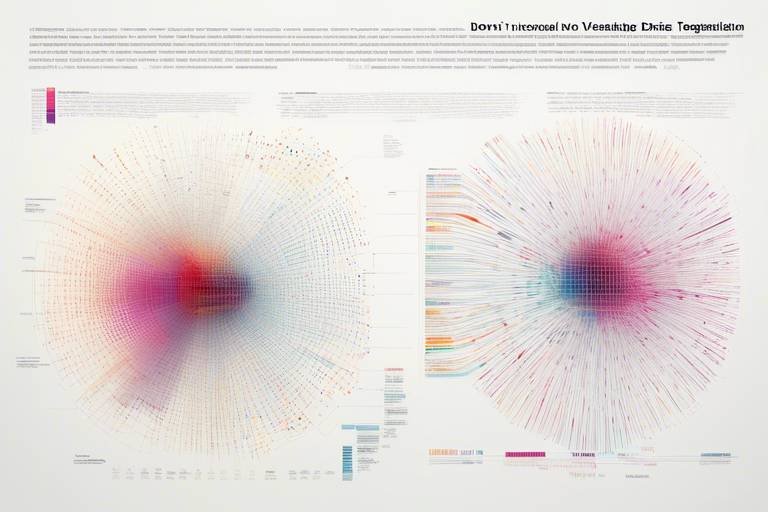How Technology is Reshaping Mental Health Services
The landscape of mental health services is undergoing a profound transformation, thanks to the rapid advancements in technology. As we navigate through the complexities of modern life, the integration of digital tools into mental health care has emerged as a beacon of hope for many. This article delves into the innovative ways technology is reshaping mental health services, making them more accessible, efficient, and personalized than ever before. Imagine being able to connect with a therapist from the comfort of your home or tracking your mood with just a few taps on your smartphone. These are not just dreams; they are realities that technology has made possible.
One of the most significant shifts has been the rise of teletherapy, which has democratized access to mental health care. No longer restricted by geographical barriers, individuals can now seek help from licensed professionals regardless of their location. This is especially crucial for those living in rural areas where mental health resources are scarce. Teletherapy has proven effective for many, offering a flexible and convenient alternative to traditional face-to-face sessions. However, it’s essential to acknowledge some potential drawbacks, such as the lack of personal connection and the challenges of navigating technology for some users.
Moreover, the proliferation of mental health apps is another game-changer. These apps empower users to take charge of their mental well-being by providing tools for self-help, mood tracking, and access to educational resources. While the benefits are significant, including increased engagement and the ability to monitor one’s mental state, there are limitations. Not every app is created equal, and users must be discerning about which ones they choose to integrate into their lives.
Effective mental health apps often include features that resonate with users. For instance, mood tracking can help individuals identify patterns and triggers, while guided meditations can provide much-needed relaxation in a hectic world. Educational content can also play a vital role in fostering understanding and awareness about mental health issues. However, as we embrace these digital tools, we must also be vigilant about data privacy concerns. With sensitive information being shared, safeguarding user data is paramount to ensure trust and security in these platforms.
To maintain user engagement, mental health apps employ various strategies, such as gamification and personalized notifications. These methods not only enhance user experience but also encourage consistent use, which is essential for achieving desired mental health outcomes. As technology continues to evolve, we can expect even more innovative features that cater to individual needs.
Another exciting development is the integration of wearable technology into mental health services. Devices like smartwatches and fitness trackers can provide real-time data on users' physical and emotional states, offering insights that can be invaluable for both users and mental health professionals. Imagine a world where your watch alerts you to increased stress levels, prompting you to take a moment to breathe and refocus. This intersection of technology and mental health opens up new avenues for proactive care.
Online support communities have also gained traction, fostering connections among individuals facing similar mental health challenges. These virtual spaces create a sense of belonging, allowing users to share their experiences and support one another. Peer support can be incredibly powerful, as it often leads to a greater understanding of one’s struggles and triumphs. However, it’s important to recognize the challenges that come with online communities, such as the potential for misinformation and the need for effective moderation.
In conclusion, the impact of technology on mental health services is both profound and multifaceted. As we embrace these innovations, it's crucial to remain mindful of the challenges they present. By fostering a balanced approach that prioritizes accessibility, privacy, and user engagement, we can harness the full potential of technology to enhance mental health care for everyone.
- What is teletherapy? Teletherapy is a form of therapy that takes place over the internet, allowing individuals to connect with mental health professionals through video calls, phone calls, or messaging.
- Are mental health apps effective? Many mental health apps can be beneficial for self-help and tracking moods, but their effectiveness can vary depending on the app and the individual user.
- How can I ensure my data is safe with mental health apps? Look for apps that prioritize user privacy, have clear data protection policies, and use encryption to safeguard your information.
- What are the benefits of online support communities? Online support communities provide a platform for individuals to connect, share experiences, and receive encouragement from others facing similar challenges.
- What challenges do online communities face? Online communities can struggle with misinformation and the lack of moderation, which can lead to confusion or harmful advice.

The Rise of Teletherapy
In recent years, teletherapy has emerged as a revolutionary approach to mental health care, reshaping how individuals access support. Imagine being able to connect with a therapist from the comfort of your own home, eliminating the need for travel and the associated stress. This convenience has made teletherapy an appealing option for many, particularly those with busy schedules or limited access to traditional mental health services. With just a few clicks, individuals can engage in meaningful conversations, share their feelings, and receive professional guidance without the barriers that often accompany in-person visits.
One of the most significant advantages of teletherapy is its accessibility. People living in rural areas or regions with a shortage of mental health professionals can now connect with qualified therapists across the country. This democratization of mental health services means that more individuals can receive the help they need, regardless of their geographical location. Furthermore, teletherapy can be particularly beneficial for those who experience anxiety or social phobias, as it allows them to seek help in a less intimidating environment.
However, while teletherapy offers numerous benefits, it is not without its challenges. For instance, the lack of a physical presence can sometimes hinder the therapeutic relationship between the client and therapist. Non-verbal cues, which can be crucial in understanding a patient's emotions, may be lost in a virtual setting. Additionally, the effectiveness of teletherapy can vary depending on the individual's comfort with technology and their ability to create a private, distraction-free environment during sessions.
Moreover, there are concerns about insurance coverage for teletherapy services. While many insurance providers have begun to recognize teletherapy as a legitimate form of treatment, coverage can still be inconsistent. Patients may find themselves navigating a complicated landscape of reimbursement policies, which can add another layer of stress to an already challenging situation.
In conclusion, teletherapy represents a significant shift in how mental health services are delivered. Its rise has opened doors for many who previously faced barriers to accessing care. As technology continues to evolve, it is crucial for both practitioners and patients to remain adaptable, ensuring that the therapeutic experience remains effective and supportive. The future of teletherapy looks promising, but it will require ongoing evaluation and adjustment to meet the diverse needs of individuals seeking mental health support.

Mobile Apps for Mental Health
In recent years, have emerged as a powerful tool for individuals seeking to enhance their emotional well-being. These apps offer a range of features designed to assist users in managing their mental health, from mood tracking to guided meditations. The convenience of having mental health resources at your fingertips is nothing short of revolutionary. Imagine being able to access support and tools for self-care right from your smartphone, anytime and anywhere! This level of accessibility is not just a luxury; it is a vital resource for many who might not have traditional therapy options available.
However, while these apps are making strides in promoting mental well-being, they come with their own set of challenges. For instance, the effectiveness of these applications can vary widely. Some users may find them incredibly helpful, while others might feel they lack the depth of professional support. Additionally, the sheer number of mental health apps can be overwhelming, leading to a paradox of choice. With thousands of options available, how do you know which app is right for you?
Many mental health apps focus on self-help techniques, offering features such as:
- Mood Tracking: Users can log their emotions and identify patterns over time.
- Guided Meditations: These help users relax and find mindfulness in their daily lives.
- Resource Libraries: Access to articles, videos, and tools that provide educational content on mental health topics.
While these features can be beneficial, it's crucial to approach them with a balanced perspective. Users should remember that apps are not a substitute for professional therapy. They can complement traditional treatment but should not replace it. It's like using a first aid kit for a minor injury; it helps, but sometimes you need to see a doctor for more serious issues.
Moreover, the effectiveness of mobile mental health apps can be influenced by user engagement. Apps that offer personalized experiences, reminders, and community features often see higher retention rates among users. This is where user experience becomes paramount. Developers are continuously working to create interfaces that are not only functional but also inviting and easy to navigate. The goal is to make mental health support feel less like a chore and more like a part of a healthy lifestyle.
As we venture further into the digital age, the integration of wearable technology with mental health apps is also on the rise. Devices like smartwatches can track physical activity, sleep patterns, and even heart rate, providing real-time data that users can analyze alongside their mental health metrics. This fusion of data can offer users a more comprehensive view of their overall well-being, much like piecing together a puzzle. The more pieces you have, the clearer the picture becomes.
In conclusion, while mobile apps for mental health are a promising avenue for improving emotional wellness, it's essential to remain mindful of their limitations. They serve as a valuable resource but should be used in conjunction with other forms of support and treatment. As technology continues to evolve, so too will the tools available for mental health care, paving the way for a future where mental health support is more accessible and tailored to individual needs.
Q1: Are mental health apps effective?
A1: Many users find mental health apps helpful for self-management, but their effectiveness can vary. They are best used as a supplement to professional therapy.
Q2: Can I rely solely on a mental health app for support?
A2: While apps can provide valuable tools and resources, they should not replace professional therapy, especially for serious mental health issues.
Q3: What features should I look for in a mental health app?
A3: Look for features like mood tracking, guided meditations, educational resources, and user-friendly design to enhance your experience.
Q4: How do I ensure my data is safe when using mental health apps?
A4: Always check the app's privacy policy and ensure it complies with data protection regulations. Look for apps that prioritize user confidentiality.

Features of Effective Mental Health Apps
In today's fast-paced world, mental health apps have emerged as a beacon of hope for many individuals seeking support and guidance. But what truly makes these apps effective? First and foremost, they need to be user-friendly. Imagine trying to navigate a complicated app when you're already feeling overwhelmed. An intuitive design can make all the difference, allowing users to focus on their mental well-being rather than struggling with technology.
One of the standout features of effective mental health apps is mood tracking. This tool allows users to log their emotions daily, providing valuable insights into their mental health patterns. By visualizing these trends over time, users can identify triggers and better understand their emotional landscape. For instance, an app might present this data in a colorful graph, making it easier to spot correlations between moods and specific events or activities.
Another crucial feature is guided meditations. These audio sessions can help users practice mindfulness and relaxation techniques, reducing anxiety and promoting a sense of calm. Think of it as having a personal meditation coach in your pocket, ready to guide you through a session whenever stress levels rise. The best apps often offer a variety of meditation lengths and styles, catering to both beginners and seasoned practitioners alike.
Furthermore, educational content is a vital aspect of effective mental health apps. Users benefit from articles, videos, and resources that provide insights into mental health conditions, coping strategies, and self-care practices. This knowledge empowers users, helping them to make informed decisions about their mental health journey. When users feel educated and informed, they are more likely to engage with the app consistently.
However, it’s not just about having these features; it’s about how they are integrated. The most effective mental health apps combine these elements seamlessly, creating a holistic experience for users. For example, a user might log their mood after a guided meditation session, allowing the app to suggest personalized content based on their current emotional state. This tailored approach enhances user engagement and promotes a deeper connection with the app.
To summarize, effective mental health apps are characterized by:
- User-friendly design that facilitates easy navigation
- Mood tracking for self-reflection and awareness
- Guided meditations to foster relaxation and mindfulness
- Educational resources that empower users with knowledge
As technology continues to evolve, the potential for mental health apps to provide innovative solutions grows exponentially. By focusing on these key features, developers can create tools that not only support users in their mental health journeys but also foster a sense of community and belonging. With the right app, individuals can take proactive steps toward better mental health, making the journey not just manageable but also enriching.
Q: Can mental health apps replace traditional therapy?
A: While mental health apps can be a valuable supplement to traditional therapy, they should not replace professional help when needed. They can provide tools and resources that enhance the therapeutic process.
Q: Are mental health apps safe to use?
A: Most reputable mental health apps prioritize user privacy and data security. However, it's crucial to read the privacy policies and understand how your data will be used.
Q: How do I choose the right mental health app for me?
A: Consider what features are most important to you, such as mood tracking, guided meditations, or educational content. Reading reviews and trying out a few apps can help you find the best fit.

Data Privacy Concerns
In an era where our lives are increasingly intertwined with technology, data privacy has emerged as a crucial concern, especially in the realm of mental health apps. These applications often collect sensitive information, including personal thoughts, feelings, and even biometric data. The fundamental question arises: how safe is this data? While the convenience of accessing mental health resources at our fingertips is undeniably appealing, it comes with the weighty responsibility of ensuring user privacy.
Many users may not fully understand the implications of sharing their mental health data. For instance, a user might download an app to track their mood swings or anxiety levels, but what happens to that data once it’s collected? Companies often have complex privacy policies that can be difficult to decipher. This lack of transparency can lead to mistrust among users. To put it simply, if individuals feel that their personal information is not adequately protected, they might hesitate to engage fully with these helpful tools.
Moreover, the potential for data breaches cannot be overlooked. Cybersecurity threats are rampant, and mental health apps are not immune. A breach could expose sensitive information, potentially leading to devastating consequences for users. Imagine feeling vulnerable and seeking support, only to find that your private data has been compromised. The psychological impact of such an event could be as damaging as the original mental health issues the app was intended to address.
To mitigate these concerns, developers must prioritize data protection measures. This includes implementing robust encryption methods, regular security audits, and transparent user agreements that clearly outline how data is collected, used, and shared. Users should be empowered with the knowledge of what data they are sharing and how it will be used. This transparency can foster a sense of trust, encouraging more individuals to utilize these beneficial resources without fear.
In summary, while mental health apps offer innovative solutions for support and self-care, the issue of data privacy cannot be ignored. As the industry evolves, it is vital for both developers and users to remain vigilant about safeguarding personal information. By prioritizing data privacy, we can ensure that technology continues to serve as a positive force in mental health care, rather than a source of anxiety.
- What types of data do mental health apps typically collect? Most mental health apps collect data related to user mood, behavior patterns, and sometimes biometric data like heart rate or sleep patterns.
- How can I ensure my data is safe when using mental health apps? Look for apps that have clear privacy policies, use encryption, and have a good reputation for data security.
- What should I do if I suspect my data has been compromised? Immediately change your passwords, contact the app's support team, and consider deleting your account if you feel uncomfortable.

User Engagement Strategies
User engagement is a crucial element in the success of mental health apps. Engaging users effectively not only enhances their experience but also promotes consistent usage, which is essential for achieving positive mental health outcomes. One of the primary strategies employed by these apps is the use of personalization. By tailoring content and recommendations based on user preferences and behaviors, apps can create a more relevant experience. For example, if a user frequently engages with mindfulness exercises, the app might suggest additional resources or similar activities, making the user feel understood and valued.
Another effective strategy is the implementation of gamification. This involves incorporating game-like elements such as rewards, challenges, and progress tracking into the app. By turning mental health practices into a more interactive experience, users are often more motivated to engage with the content. Imagine earning points for completing daily mood check-ins or receiving badges for maintaining a streak of meditation sessions. These small incentives can significantly increase user retention and encourage users to prioritize their mental well-being.
Additionally, community features can foster a sense of belonging among users. Many successful mental health apps include forums or chat functions that allow users to connect with one another. This social interaction can provide emotional support and make users feel less isolated in their struggles. It’s like having a virtual support group at your fingertips, where you can share experiences and advice with others who truly understand what you’re going through.
Moreover, regular push notifications can serve as gentle reminders for users to engage with the app. These notifications can encourage users to check in on their mood, complete a guided meditation, or read a motivational article. However, it’s essential to strike a balance here; too many notifications can lead to annoyance and disengagement. Therefore, allowing users to customize their notification preferences can enhance their experience and keep them engaged without feeling overwhelmed.
Finally, providing educational content is another powerful strategy. Many users are eager to learn more about mental health topics, coping strategies, and self-care techniques. By offering articles, videos, or podcasts within the app, developers can position their platform as a valuable resource for users. This not only enhances user engagement but also empowers individuals to take control of their mental health journey.
In summary, user engagement strategies in mental health apps are multifaceted, combining personalization, gamification, community features, thoughtful notifications, and educational content. By focusing on these elements, app developers can create a more compelling and supportive environment for users, ultimately leading to improved mental health outcomes.
- What are the benefits of using mental health apps? Mental health apps can provide users with tools for self-help, mood tracking, and easy access to resources, enhancing overall mental well-being.
- Are mental health apps effective? Many users find mental health apps helpful, especially when combined with traditional therapy. However, their effectiveness can vary based on individual needs.
- How do I choose the right mental health app? Look for apps that offer features that align with your needs, such as mood tracking, educational content, and community support.
- What should I do if I feel overwhelmed by notifications from an app? Most apps allow you to customize notification settings. Adjust these settings to reduce the frequency of alerts.

Integration with Wearable Technology
The integration of wearable technology into mental health services is nothing short of revolutionary. Imagine wearing a device that not only tracks your physical activity but also monitors your emotional well-being! These gadgets, such as smartwatches and fitness trackers, are now capable of collecting real-time data on various physiological indicators like heart rate, sleep patterns, and even stress levels. This data can be invaluable for mental health professionals and users alike, offering insights that were previously difficult to obtain.
For instance, a smartwatch can alert you when your heart rate spikes during moments of anxiety, providing an opportunity to practice mindfulness or breathing exercises. This immediate feedback loop empowers users to take charge of their mental health proactively. Furthermore, the data collected can be shared with therapists, allowing for more tailored treatment plans that consider the user's daily experiences. The synergy between technology and mental health not only enhances self-awareness but also bridges the gap between patients and providers.
However, it's essential to recognize that while technology offers exciting possibilities, it also comes with challenges. For instance, the effectiveness of wearable technology in mental health depends heavily on user engagement. If individuals do not consistently wear their devices or engage with the data, the potential benefits diminish significantly. Additionally, the interpretation of data can be complex; not every spike in heart rate indicates a mental health crisis. Therefore, users must be educated about the technology and its implications.
Moreover, the integration of wearables raises questions about data privacy. Users must trust that their sensitive information is being handled securely and ethically. As more people turn to these technologies for mental health support, mental health apps and wearable manufacturers must prioritize robust security measures to protect user data. This is a crucial step in fostering trust and encouraging more individuals to embrace these innovative tools.
As we look toward the future, the potential for wearable technology in mental health services seems boundless. With advancements in artificial intelligence and machine learning, we could soon see wearables that not only track data but also analyze it in real-time, offering personalized mental health interventions right when they are needed most. Imagine a world where your watch reminds you to take a break when it detects rising stress levels, or suggests a short meditation session based on your mood trends. This level of integration could redefine how we approach mental health, making it more accessible and personalized than ever before.
In conclusion, the integration of wearable technology into mental health services is a game-changer. It offers a unique blend of real-time data collection, personalized insights, and proactive support. As we continue to explore this intersection, it’s crucial to address the challenges while maximizing the benefits, ensuring that mental health support becomes more effective and engaging for everyone.
- What types of wearable devices are most effective for mental health? Devices like smartwatches and fitness trackers that monitor heart rate, sleep patterns, and physical activity are among the most effective.
- How can wearables improve my mental health? Wearables can provide real-time feedback on your physiological states, helping you identify triggers and manage stress more effectively.
- Are my data and privacy safe with mental health wearables? It's crucial to choose devices and apps that prioritize data security and offer clear privacy policies to protect your information.

Online Support Communities
In today's fast-paced world, where mental health struggles often feel isolating, have emerged as a beacon of hope for many individuals. These digital platforms allow people to connect with others facing similar challenges, creating a sense of belonging that is often hard to find in traditional settings. Imagine walking into a room filled with people who understand your struggles without saying a word; that's the power of these online spaces. They provide a unique opportunity for individuals to share their stories, seek advice, and find comfort in knowing they are not alone.
One of the most significant advantages of online support communities is their accessibility. Whether you're in a bustling city or a remote area, all you need is an internet connection to join a group that resonates with you. This accessibility breaks down geographical barriers and allows individuals from diverse backgrounds to come together. For example, forums, social media groups, and dedicated mental health platforms offer a range of options for users to engage and participate. However, it's essential to remember that while these communities can be incredibly supportive, they also come with their own set of challenges.
Many online support communities thrive on the exchange of personal experiences. Members often share their journeys, coping strategies, and resources that have helped them along the way. This exchange not only fosters empathy but also empowers others to take actionable steps towards their recovery. However, it's crucial to approach the information shared in these communities with a discerning eye. Misinformation can spread quickly, and not every piece of advice is grounded in professional expertise. Therefore, users must remain vigilant and consult mental health professionals when necessary.
The anonymity that online forums provide can be both a blessing and a curse. On one hand, it allows individuals to express their feelings without fear of judgment, enabling open discussions about sensitive topics. On the other hand, this same anonymity can lead to a lack of accountability, where harmful behaviors or negative advice might flourish. Moderation is key in these communities; having guidelines and active moderators can help maintain a safe and supportive environment for all members.
In summary, online support communities play a vital role in the mental health landscape today. They offer a platform for connection, understanding, and shared experiences, which can significantly enhance the recovery journey. However, users must navigate these spaces wisely, ensuring they seek out accurate information and engage in communities that promote positivity and growth.
- What are online support communities? - These are digital platforms where individuals can connect, share experiences, and provide mutual support regarding mental health challenges.
- How can I find a suitable online support community? - Look for groups that align with your specific needs, interests, and values. Platforms like Facebook, Reddit, and dedicated mental health websites often have various options.
- Are online support communities safe? - While many are safe and supportive, it’s essential to be cautious. Always check for moderation, guidelines, and user reviews before engaging.
- Can online support replace professional therapy? - While online communities can provide valuable support, they should not replace professional mental health treatment. They can complement therapy but are not a substitute.

Benefits of Peer Support
Peer support has emerged as a powerful tool in the realm of mental health, providing individuals with a unique opportunity to connect with others who share similar experiences. This connection fosters a sense of belonging and understanding that can be incredibly healing. Imagine being in a room full of people who truly get what you're going through; it's like finding a lighthouse in a stormy sea. Peer support groups often serve as safe spaces where individuals can express their feelings, share their struggles, and celebrate their victories without the fear of judgment.
One of the most significant benefits of peer support is the validation it offers. When someone shares their story, it can resonate deeply with others, affirming their own feelings and experiences. This mutual understanding can reduce feelings of isolation and loneliness, which are common in those dealing with mental health issues. In fact, studies have shown that individuals who engage in peer support often report lower levels of anxiety and depression. It's like having a personal cheerleading squad that not only encourages you but also understands your journey.
Moreover, peer support can enhance motivation and accountability. When individuals see others making progress, it can inspire them to take steps toward their own recovery. This collective journey can create a ripple effect, where one person's triumph encourages another to keep pushing forward. It's a powerful reminder that recovery is not a solitary path; it's a shared experience that can be enriched by the stories and support of others.
In addition to emotional benefits, peer support can also provide practical resources. Many peer support groups share valuable information about coping strategies, treatment options, and local resources. This exchange of knowledge can empower individuals to make informed decisions about their mental health care. For instance, a member might recommend a therapist or a helpful app, creating a network of support that extends beyond the group itself.
However, it's important to note that peer support is not a replacement for professional mental health treatment. While it can complement therapy and medication, it should be viewed as an addition to a comprehensive treatment plan. The synergy between professional help and peer support can create a holistic approach to mental wellness, addressing both the emotional and practical aspects of recovery.
In summary, the benefits of peer support are vast and varied. From emotional validation and motivation to practical resources and a sense of community, peer support plays a crucial role in mental health recovery. It's a testament to the power of human connection, reminding us that we are not alone in our struggles. As we continue to navigate the complexities of mental health, fostering these supportive communities will be essential in creating a more inclusive and understanding environment for everyone.
- What is peer support? Peer support involves individuals sharing their experiences and providing emotional and practical help to one another.
- How can I find a peer support group? Many organizations offer peer support groups, which can often be found through local mental health services, online platforms, or community centers.
- Is peer support a substitute for professional therapy? No, peer support is meant to complement professional treatment, not replace it.
- What are the benefits of joining a peer support group? Benefits include emotional validation, motivation, practical resources, and a sense of belonging.

Challenges of Online Communities
The emergence of online support communities has undoubtedly revolutionized the way individuals connect and share their mental health journeys. However, it’s essential to recognize that these digital platforms are not without their challenges. One of the most pressing issues is misinformation. In the vast expanse of the internet, it’s all too easy for inaccurate information to spread like wildfire. Users may come across unverified advice or harmful tips that could exacerbate their mental health conditions instead of providing relief. This poses a significant risk, especially for those who are vulnerable and seeking guidance.
Another challenge that online communities face is the lack of moderation. Unlike traditional therapy settings, where a trained professional guides discussions, online forums often lack the necessary oversight. This can lead to toxic environments where negativity, bullying, or harmful behaviors flourish. Imagine walking into a room filled with people sharing their struggles, but instead of support, you encounter judgment and hostility. It can be disheartening and may even deter individuals from seeking help altogether.
Moreover, the anonymity that online platforms provide can be a double-edged sword. While it allows individuals to express themselves freely, it can also lead to unaccountable behaviors. Some users may feel emboldened to share inappropriate content or engage in harmful discussions without facing any repercussions. This not only undermines the purpose of these communities but can also create an unsafe space for those genuinely seeking support.
Additionally, the over-reliance on digital interactions can sometimes lead to feelings of isolation. While online communities can foster connections, they can also create a false sense of belonging. Users may feel connected to others through screens but still experience loneliness in their offline lives. It’s crucial for individuals to strike a balance between online support and real-world interactions, as both are essential for holistic mental health recovery.
Lastly, there’s the challenge of accessibility. Not everyone has equal access to the internet or the technological skills required to navigate these platforms. This digital divide can leave many individuals without the support they need. It’s important for community organizers and platform developers to consider inclusive practices that ensure everyone can benefit from these resources.
In summary, while online support communities offer valuable connections and resources for mental health, they come with their own set of challenges. Addressing misinformation, ensuring moderation, managing anonymity, balancing online and offline interactions, and improving accessibility are critical steps that need to be taken. By recognizing and tackling these issues, we can create safer, more supportive environments for those in need.
- What are online support communities? Online support communities are digital platforms where individuals can connect with others facing similar mental health challenges, share experiences, and provide mutual support.
- How can I find a reliable online support community? Look for communities that are moderated by professionals or have guidelines in place to ensure respectful and constructive interactions.
- What should I do if I encounter misinformation in an online community? If you come across misinformation, it's best to verify the information through trusted sources and report it to the community moderators if possible.
- Can online support communities replace traditional therapy? While online communities can provide valuable support, they should not replace professional therapy. They can complement traditional methods but are not a substitute for professional help.
Frequently Asked Questions
- What is teletherapy and how does it work?
Teletherapy refers to therapy sessions conducted over video calls or phone calls, allowing individuals to receive mental health support from the comfort of their own homes. It works by connecting clients with licensed therapists through secure online platforms, making it easier to access help without the need for in-person visits.
- Are mental health apps effective?
Mental health apps can be effective tools for self-help and mood tracking. They offer resources and exercises that can help users manage their mental well-being. However, their effectiveness can vary based on individual needs and the quality of the app. It's essential to choose apps backed by research and designed by mental health professionals.
- What features should I look for in a mental health app?
When choosing a mental health app, look for features such as mood tracking, guided meditations, educational content, and community support. These elements can enhance your experience and help you stay engaged with your mental health journey.
- How can I ensure my data is safe when using mental health apps?
To safeguard your data while using mental health apps, choose platforms that prioritize user privacy and have clear data protection policies. Look for apps that use encryption and allow you to control your data sharing preferences.
- What are the benefits of online support communities?
Online support communities provide a platform for individuals to connect with others facing similar mental health challenges. They foster a sense of belonging and understanding, which can be incredibly beneficial for recovery and emotional support.
- What challenges do online support communities face?
While online support communities offer valuable connections, they can also encounter challenges such as misinformation, lack of moderation, and potential negative interactions. It's important for users to approach these platforms with caution and seek out reputable communities.



















